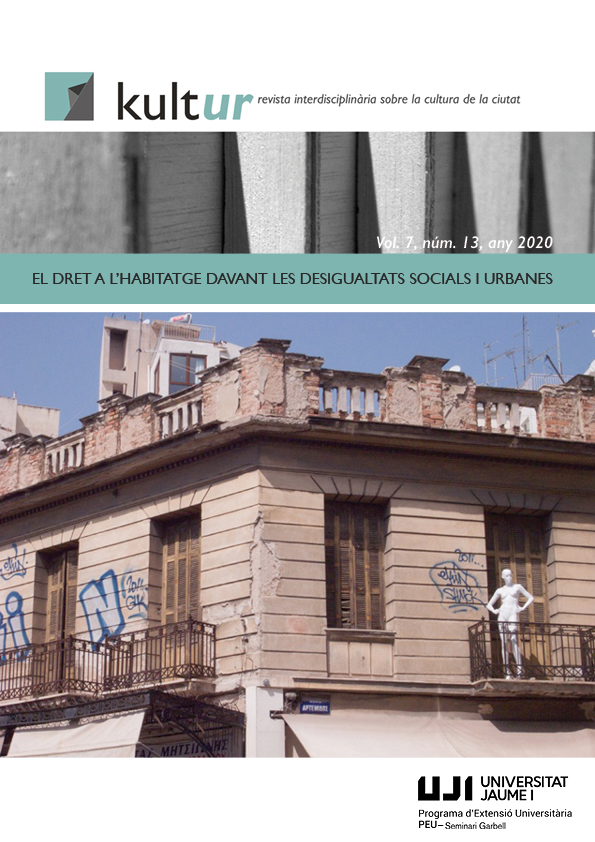Social inequality and homeownership from a comparative perspective: Is there a return of the welfare state?
##plugins.themes.bootstrap3.article.main##
Resum
Esping-Andersen’s typology of welfare state regimes has been one of the most influential contributions to comparative studies. The general picture of this typology has four variants: social democratic, conservative, southern European, and liberal regimes. This typology becomes controversial particularly when homeownership inequalities are considered. Our study aims to evaluate the sustainability of the welfare state regime typology with regard to reducing inequalities of homeownership. The paper uses data from the Luxembourg Income Study to analyze the changes in homeownership rates for low-income populations as compared to the entire population. We compared ten countries representing various welfare regimes from 2000 to 2013/16 to examine the variations of homeownership and social inequalities over time. The results show that the distribution of countries seems to have a negative correlation between welfare regimes (according to the Gini index) and homeownership rates. In liberal countries (except Canada) and southern European countries, homeownership rates fell over time. In most of these countries, low-income populations experienced the highest decline in homeownership rates during the observed period.
Descàrregues
##plugins.themes.bootstrap3.article.details##
.png)
Tots els continguts de la revista kult-ur se distribueixen sota una llicència d'ús i distribució Creative Commons Atribució-Compartir Igual 4.0 Internacional (CC BY-SA 4.0), excepte indicació contrària. Pot consultar ací la versió informativa i el text legal de la llicència. La indicació de la llicència d'ús i distribució CC BY-SA 4.0 ha de constar expresament d'aquesta manera quan siga necessari.
Referències
Arundel, R., & Ronald, R. (2015). Parental co-residence, shared living and emerging adulthood in Europe: semi-dependent housing across welfare regime and housing system contexts. Journal of Youth Studies. doi:10.1080/13676261.2015.1112884
Barlow, J., & Duncan, S. (1994). Success and fail ure in housing provision. European systems compared: Oxford: Pergamon Press.
Bernard, P., & Raïq, H. (2011). Le Québec est-il une société égalitaire: Institut du nouveau monde (Boréal).
Bernardi, F., & Poggio, T. (2004). Home Ownership and Social Inequality in Italy. In K. Kurz & H.-P. Blossfeld (Eds.), Home Ownership and Social Inequality in Comparative Perspective: Stanford University Press.
Brueckner, J. K. (2000). Welfare Reform and the Race to the Bottom: Theory and Evidence. Southern Economic Journal, 66(3).
Dawkins, C. J. (2017). Autonomy and Housing Policy. Housing, Theory and Society, 34(4), 420–438.
Dewilde, C., & De Decker, P. (2015). Changing Inequalities in Housing Outcomes across Western Europe. Housing, Theory and Society, 33(2), 121-161. doi:10.1080/14036096.2015.1109545
Doling, J., & Ronald, R. (2010). Home ownership and asset-based welfare. Journal of Housing and the Built Environment, 25(2), 165-173. doi:10.1007/s10901-009-9177-6
Dufour, P., & Boismenu, G. (2003). L’aide au conditionnel. La contrepartie dans les mesures envers les personnes sans emploi en Europe et en Amérique du Nord. Presse de l’université de Montréal.
Esping-Andersen, G. (1990). The three worlds of welfare capitalism. New Jersey.
Esping-Andersen, G. (2009). The Incomplete Revolution: Adapting to Women’s New Roles. Cambridge: Polity Press.
Esping-Andersen, G. (2017). Politics against Markets: The Social Democratic Road to Power.
Fitzpatrick, S., & Watts, B. (2018). Final findings: Social Housing (fixed-term tenancies). Welfare Conditionality: Sanctions, Support and Behaviour. York: University of York.
Hoffman, A. v. (2012). History lessons for today’s housing policy: the politics of low-income housing. Housing Policy Debate, 22(3), 321–376.
Huber, E., & Stephens, J. D. (2001). Developments and Crisis of the Welfare State: Parties and Policies in Global Markets: The University of Chicago Press.
Kemeny, J. (2001). Comparative housing and welfare: Theorising the relationship. Journal ofHousing and the Built Environment, 16, 53-70.
Kurz, K., & Blossfeld, H.-P. (2004). Home Ownership and Social Inequality in Comparative Perspective: Stanford University Press.
Maclennan, D., & Miao, J. (2017). Capital, Housing And Inequality In The 21st Century. Housing, Theory and Society, 34(2), 127-145.
Mavrozacharakis, E., & Tzagkarakis, S. I. (2018). Modern Welfare State and Social Democracy: Interdependence and Policy Importance. Open Access Library Journal, 5(e4406).
Misra, J., & Buding, M. (2007). Reconciliation policies and the effects of motherhood on employment, earning and poverty. Journal of Comparative Policy Analysis, 9(2), 135-155.
Mulder, C. H. (2004). Home Ownership and Social Inequality in the Netherlands In K. Kurz & H.-P. Blossfeld (Eds.), Home Ownership and Social Inequality in Comparative Perspective: Stanford University Press.
Ruonavaara, H. (2012). Home ownership and Nordic housing policies in ‘retrenchment’. In R. Ronald & M. Elsinga (Eds.), Beyond Home Ownership Housing, Welfare and Society.
Saint-Arnaud, S., & Bernard, P. (2003). Convergence or Resilience? A Hierarchical Cluster Analysis of the Welfare Regimes in Advanced Countries. Current Sociology, 51(5), 499–527.
Silverman, R. M. (2011). The Four Horsemen of the Fair Housing Apocalypse: A Critique of Fair Housing Policy in the USA. Critical Sociology, 38(1), 123 –140.
Smeeding, T. M. (2006). Poor People in Rich Nations: The United States in Comparative Perspective. Journal of Economic Perspectives, 20(1).
Stephens, M. (2016). Using Esping-Andersen and Kemeny’s Welfare and Housing Regimes in Comparative Housing Research. Critical Housing Analysis, 3(1), 19-29.
Van den Berg, A., Plante, C., Raïq, H., Proulx, C., & Faustmann, S. (2017). Combating Poverty: Quebec’s Pursuit of a Distinctive Welfare State: University of Toronto Press.
Varadya, D. P., & Matos, F. (2017). Comparing public housing revitalization in a liberal and a Mediterranean society (US vs. Portugal). Cities, 64(April), 37-46.
Voigtländer, M. (2009). Why is the German Homeownership Rate so Low? Housing Studies, 24(3), 355-372. doi:10.1080/02673030902875011
Walks, A. (2014,). Canada’s Housing Bubble Story: Mortgage Securitization, the State, and the Global Financial Crisis. International Journal of Urban and Regional Research, 38(1), 256-284.
Wilkinson, R., & Pickett, K. (2011). The Spirit Level: Why Greater Equality Makes Societies Stronger: Bloomsbury Publishing; Reprint edition.
Wulfgramm, M., Bieber, T., & Leibfried, S. (2017). Welfare State Transformation and Inequality in OECD Countries. Palgrave Macmillan, London.


